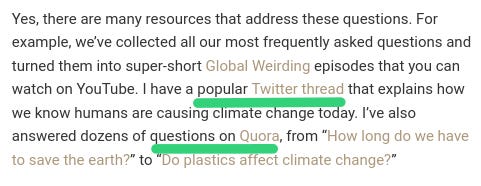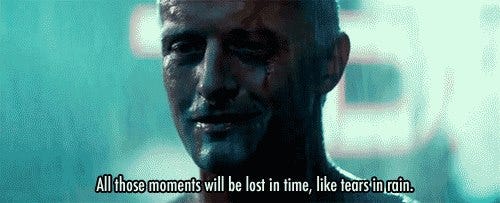What we should all learn by a famous climate scientist about... online publishing
it's something as old, as it is important.
it's something as old, as it is important.
Prof. Hayhoe is a climate scientist, included in Time's 2014 list of “100 Most Influential People in the World”, and named by the New York Times "one of the nation’s most effective communicators on the threat of climate change" in 2016.
This, however, is not a post about climate change. Not at all. Here, I only discuss one thing, about "effective communication", that Prof. Hayhoe and many other famous communicators in literally every part of society are doing in the same way.
"A dozen other online platforms"
I confess that I discovered the existence of Prof. Hayhoe only yesterday when, by pure chance, I came across something she tweeted on March 30, 2023. Namely, her announcement that she "regularly shar[es] unique content on a dozen other online platforms...and you won't see most of it on Twitter".
As of March/April 2023 (follow the tweet for direct links), that unique content from Prof. Hayhoe consisted of:
MailChimp newsletter for climate change news
LinkedIn for longer posts for knowledgeable audiences
Instagram for pics and chat
Facebook for faith-based content, and climate change content suitable for sharing with friends and relatives
trying TikTok
Two YouTube channels to archive all her online talks and interviews
Pinterest for climate change memes, infographics and printable colouring pages
Quora to answer popular climate change questions
Accounts on Mastodon, and BlueSky and Post News
Last but not least, a website, updated "semi-regularly with new articles, interviews, talks, and essays"
Last week, she also added a free SubStack newsletter.
Wow! But wait...
Before continuing, let me say it again: this has nothing to do with climate change, or anyone's position about it. Don't let climate change as such distract you here and now. Here, let's only talk about communication. And let's also ignore, because it is equally irrelevant here, the fact that Prof. Hayhoe must have some paid staff to assist her, otherwise she could never eat or sleep. This said...
First thing, WOW! Fourteen or fifteen very different "channels", each with unique content and all of great quality as far as I can tell, is truly impressive. I sincerely am half in awe, half envious of such productivity, and all the reach it brings.
Now, there is no question that since each platform has unique features, strengths and limits, any given "content" should be "repackaged" differently on each of them, in order to reach as many people as possible. Whoever does have enough resources should do so, of course. The only but essential beef I have with this whole way of working is this:
Why on Earth is the website listed LAST, and above all: why on Earth is it almost EMPTY?
While I am writing this, the most recent immediately visible entry (more on this below) in the Posts page is almost five years old:
Why does the FAQs page point only to Twitter threads or Quora answers, instead of real posts on the website?
Why, to make just one example, wasn't a good, important explanation like this published first as a surely much more readable, way more permanent post on the website?
That is, why does almost 100% of that huge communication effort exist only scattered across 14/15 walled gardens, all of which may delete all one's content in any moment, for any reason, and whose only purpose, since their birth, has always been to profile, isolate and polarize individuals?
"Twitter" was bad even before "last October"
A few days ago, Prof Hayhoe tweeted that "the changes that have been made to Twitter algorithms since last October make it harder to find and listen to scientists". That's something that, for all practical purposes, amounts to a partial "block" of effective communication by and with those scientists, right?
Fact is, well before October 2022 we were already living, all of us, in a world where that same single, never-voted-by-anyone person could unilaterally decide to "block" much more than tweets, from the night sky to war communications, even for people who never used Twitter and may never use it. But I (maybe) digress, let's look elsewhere to make my one point clear.
Same with Facebook...
A Canadian “link tax” law that went into effect on June 22 2023, requires social media that link to online news sites to pay those sites for the links. Rather than pay, Facebook reacted by " no longer allowing its users in Canada to post links to news sites".
This week, as a direct consequence of that decision, the residents of Yellowknife and other Canadian towns could not share via Facebook critical, possibly life-saving information about the wildfires that were destroying their neighborhoods.
Christine Hall says on FossForce that Facebook is blameless, THIS time (and for what it's worth, I more or less agree, but that's another post). Prof. Hayhoe, instead, retweeted that "This isn't benign - it risks people's lives. The Competition Bureau should starts an investigation against Meta for abuse of dominance now." Whoever is right though, the main, basic issue doesn't change: depending on any platform that's as unaccountable as a sovereign rogue state to "share" anything relevant is anything but smart for both sides of the page, publishers and readers. Even here, nothing new, of course. It's dumb, even when Presidents do it.
Same with Google...
Google deliberately forgets "old" links and actively puts itself in the way, making of the whole Internet "a lump of Google" since at least 2007 , then doing more of the same with AMP and currently morphing into a plagiarism engine that HIDES original content.
... and everybody else. I could continue with more platforms, but by now it should be clear that every "effective communicator" that works exclusively on "platforms" is just sitting on an equal number of time bombs, by definition.
How it should be instead
Online, possibly real-time conversations are another issue. But whoever can afford to post so much content optimized in so many different ways can surely do the one and only Right Thing too, which is POSSE, of course, that I may translate as "first Publish on your Own Site, then Syndicate Elsewhere".
On their part, people should do nothing more, nothing less than what even a communications lecturer explicitly prescribed right after the "wildfire news block" in Canada: "go directly to reputable [sources, of whatever kind] as they did before social media’s complete dominance. We have to relearn how to make the wheel."
Why no visible RSS at katharinehayhoe.com?
Indeed, people absolutely MUST "relearn how to make the wheel". I've said the same thing for years. In practice, "going directly to reputable news sites" is way, way simpler and quicker than one may think, thanks to apps ("Feed Readers") that can directly download and display headlines from many different website, using the open standard called RSS.
RSS is great. Every decent website management system publishes at least one RSS feed, by default, including www.katharinehayhoe.com:

you must just point any RSS Feed Reader to that URL to get all that is published there, straight from the actual source, without profiling, advertising, filtering, herds of trolls, and similar abuses. What's not to like?
Trouble is (and this cannot be the fault of any platform) in recent years more and more "effective communicators" have started to actively, effectively shoot themselves in the foot, by hiding their RSS capabilities, as if they were ashamed to have them. Including, again, www.katharinehayhoe.com:
Why on Earth, since the website does have an RSS feed, it doesn't show its icon before those of social media accounts? That's material for the "snob RSS" Hall of (constructive!) Shame! Then again, until the upstream, core problem is fixed, showing the RSS feed wouldn't do much:
As you can see in this screenshot, as of 2023/08/22, that RSS feed shows that there were only ten website posts in eight months. In other words, if things stay that way, 99.9999% of all that communication effort above will be lost for good as soon as (not "if"!) those platforms take it down, or disappear altogether.
Practice what you preach? Of course
At this point, you may be asking why am I writing this on a platform, instead of my own blog.
Indeed, I do have a blog, on which I already shared more than a million words and aim to add (with your help, of course) another million, including everything I publish here. It's not as effective as Prof. Hayhoe's 15 channels, no question. Not in the short/medium term for sure. But it's been all there for ~16 years now, always at the same URLs, always with NO paywalls, advertising or tracking, and still much more durable than any platform. Then, if you ask me why I recently "surrendered" to a managed newsletter, the half-joking answer, is "it's all your fault, of course". Of course, should you became a subscriber of this newsletter, possibly a paid one, that would help me a lot. But since all SubStack newsletters also have an RSS feed, you may follow me via RSS anyway, even without subscribing. Back to the main topic now.
Take-home message: being Roy Batty is NEVER "effective communication"
This is the meta-problem that all the "effective communicators" have, in every field: optimizing for platforms is effective on the moment, but publishing only on platforms is exactly the opposite. It's like being the Roy Batty replicant in Blade Runner, just online and not by design, but by free, dumb choice:
Heck, nothing of this is new. I am just one of the many who have been saying this about Tumblr in 2018, after saying the same about Google Reader in 2013, and Geocities in 2009 and many other times for decades now, while Musk was still happy, more or less harmlessly, with rockets and Teslas.
But in 2023, why communication professionals still keep locking themselves inside really ephemeral cages is beyond me, really. Whatever it is, it must be the same thing that gave Musk the guts to say "If you’re a journalist who wants more freedom to write and a higher income, then publish directly on this platform!" this very morning! But it's still terribly counterproductive, and just wrong. It just doesn't make sense. So please:
If you are Prof. Hayhoe, or any other “online publisher” just go POSSE now
If you are a reader, just demand POSSE, then get any RSS feed reader and start using it now







This is amazing feedback. This was more informative and constructive than 90% of my college ad courses